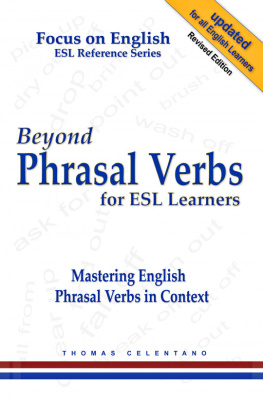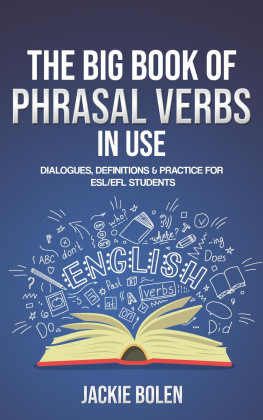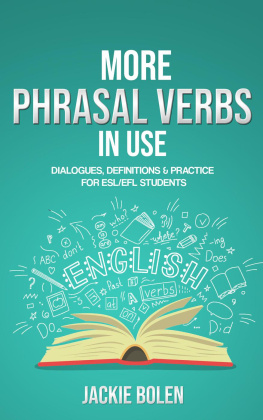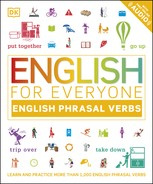Focus OnEnglish
Reference Series
Making the difficult partsof learning English easy!
Beyond PhrasalVerbs:
Mastering Phrasal Verbs inContext for ESL Learners
by
Thomas A. Celentano
Copyright 2008 by Thomas A.Celentano
Revised 2020
All rights reserved.
No part of this book may be reproducedin any form without the express written permission of the copyrightholder.
For all inquiries, pleasecontact us on our website:
http://www.FOEBooks.com
Dedication
To my students everywhere
Note to Students
We recommend that Englishlearners practice the exercises in this book in a group with otherstudents. Group learning is a fun way to improve your English morequickly.
A free audio version of this book can be found at:
https://foebooks.com/index.php/beyond-phrasal-verbs-audio/

Focus onEnglish Mini Series Books
Making the difficult partsof learning English easy
Beyond PhrasalVerbs:
Mastering Phrasal Verbs inContext for ESL Learners
Efficient and ubiquitous,English phrasal verbs provide the ESL learner with a window ontothe world of fluent English communication. Found in English idiomsof all descriptions, the ESL learner who masters phrasal verbs willhave access to vast areas of every day English communication. Muchof informal English expression, slang, and jargon are structuredaround phrasal verbs.
This Focus onEnglish book not only contains a comprehensive listing of commonEnglish phrasal verbs, but also goes to lengths to explain meaningsand variations of usage, including slang and informal expressions.The student will find clear, simple, explanations for each of thephrasal verbs, followed by examples of their correct usage in asentence.
Students canpurchase a Focus on English digital audio book versionof this book (for smart phones and other digital devices, availableseparately from www.FOEBooks.com). If the student has this Focus onEnglish digital audio book, then he or she will be able to listen tohow these phrasal verbs are actually spoken by a native Englishspeaker. This method helps the student remember the lesson moreeasily and also helps the student withpronunciation.
Chapter 2: Phrasal verbs beginning with the
letter C
Chapter 4: Phrasal verbs beginning with the
letter G
Chapter 5: Phrasal verbs beginning with the
letter H
Chapter 6: Phrasal verbs beginning with the
letter K
Chapter 7: Phrasal verbs beginning with the
letter L
Chapter 9: Phrasal verbs beginning with the
letter P
Chapter 12: Phrasal verbs beginning with the
letter T
Introduction
Focus onEnglish Books for ESL Learners
Making the difficult partsof learning English easy
Phrasal Verbs MadeEasy
Mastering Phrasal Verbs inContext for ESL Learners
English phrasal verbs arevery important in the English language. Learning them will help theESL learner to become one step closer to the world of fluentEnglish communication. Found in English idioms and expressions ofall descriptions, the ESL learner who masters phrasal verbs willhave access to large areas of everyday English communication. Muchof informal English expression, slang, and jargon are structuredaround phrasal verbs.
This Focus onEnglish book not only containsa comprehensive listing of common English phrasal verbs, but alsogoes to lengths to explain meanings and variations of usage,including slang and informal expressions. The student will findclear, simple, explanations for each of the phrasal verbs, followedby examples of their correct usage in a sentence. Once youvemastered English phrasal verbs, you are ready to challenge yourselfwith the real-life English expressions found in our book, EnglishExpressions for Real Life(now available withaudio)!
Chapter 1 - Phrasal verbs beginning with the letters A andB
In this and following sections youwill learn how to use many different phrasal verbs correctly in asentence.
There are two kinds of phrasalverbs, separable and inseparable. Separable phrasal verbs can takean object between the verb and the preposition. For example: My father picked me up after school and drove me home. Inseparable phrasal verbs cannot take an objectbetween the verb and the preposition. For example: I asked myfriends to come along with me to the Christmas party. Comealong cannot be separated by anobject.
The numbers in front of theexamples that are in parenthesis ( ), correspond to the number ofthe explanation found directly above. So, for example: (1) explanation... refersto (1) example... . If there is only one explanation or meaning given for the phrasalverb, then there will be two examples given for the one explanationand there won't be a number in front of the examples.
There will be a review at the end of thischapter.
Phrasal verbs beginningwith the letters A and B
Aim at (separable):
(1) To point something at something orsomeone; sometimes a gun or other weapon, as in this example:The soldieraimedhis rifleatthe target.
(2) Intending to finish at a certaindestination or goal, as in this example: Were hoping to finishthis evening. Wereaimingat8pm.
More examples:
(1) The man aimed the gunat the bank teller.
(2) The president of the company aimed at increasing his bank customers by 15%.
Ask for (separable):
(1) To request something from someone, as inthis example: Iaskedthe waitressforthe bill.
(2) To be due something, sometimes used toexpress consequence for something you did or did not do, as in thisexample: Allan never insured his car.When he had anaccident, he had to pay for the damage. He reallyasked forit.
More examples:
(1) The customer asked thestore clerk for a box for her newdress.
(2) Bill lost all of his money gambling. Hereally asked for it when he bet all of his moneyin one night.
 Meaning: he was really tempting bad luck when hedecided to bet all of his money the way he did.
Meaning: he was really tempting bad luck when hedecided to bet all of his money the way he did.
Ask out (separable):
(1) To invite someone to go somewhere (usuallyused in romantic situations), as in this example: Iaskedthe new girl in schooloutfor dinner.
More examples:
(1) My boyfriend asked meout. We are going to the moviestonight.
(1) My sister told me that that new boy in theschool asked her out.
Ask over (separable):
(1) Usually used to invite someone to oneshome, as in this example: Iaskedmycolleaguesoverfor dinner onFriday.
More examples:
(1) Lets ask your teacherover for dinner Saturday night.
(1) My girlfriend asked meover to her house to meet herparents.
Back down (inseparable):
(1) Means to give up; to shy away from,usually, some kind of challenge, as in this example: Thestudents wanted the teacher to change the exam date because theexam date was the same date as the concert. The teacher didntback down.
More examples:
(1) We are not going to backdown, we want a pay raise from the company or we willstrike.
(1) My mother told me I couldnt go out thisweekend. I argued with her but she didnt
Next page

















 Meaning: he was really tempting bad luck when hedecided to bet all of his money the way he did.
Meaning: he was really tempting bad luck when hedecided to bet all of his money the way he did.